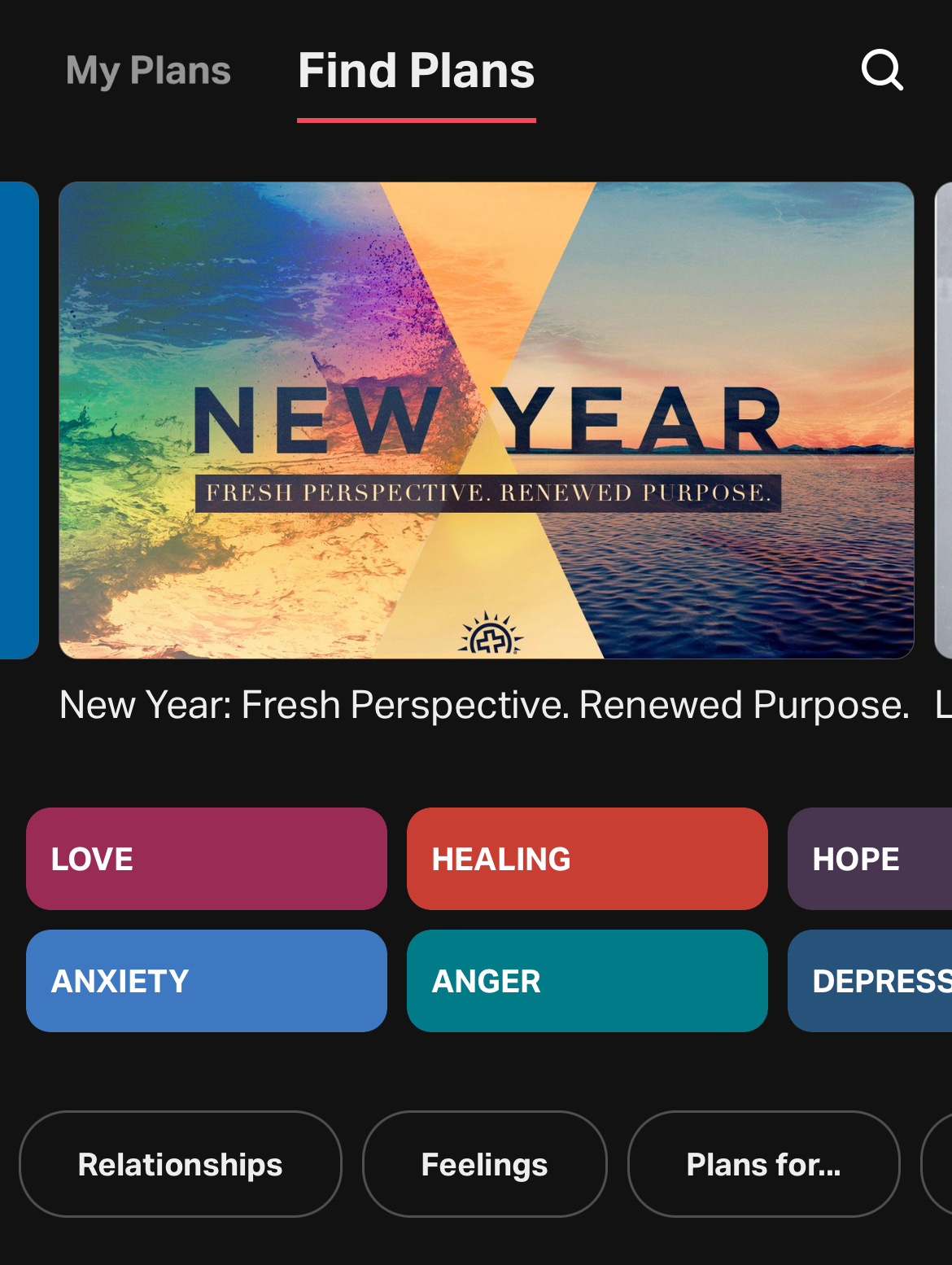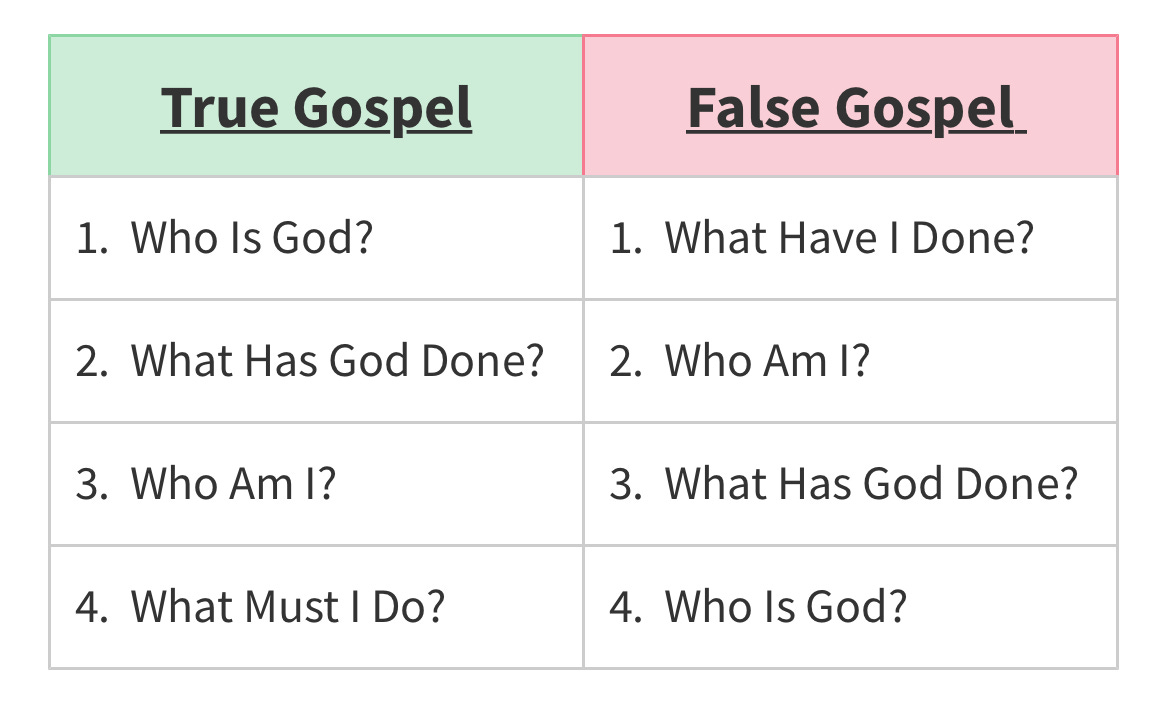The Problem with Quiet Time (And How to Fix It)
Spending time with God is about more than just our feelings.

Like many at the turn of a new year, this past week I found myself working to start out 2023 on the right foot. Amid my efforts to get rid of excess junk food in the house and achieve the mythical Inbox Zero1, I decided I would try out using my Bible app more often. I’ve used the Bible App on and off in the past and generally keep it on my phone just for the convenience. Within the app, there’s an option to follow a curated plan for daily readings and devotions. I clicked on the “Plans” tab to begin a reading plan, and my choices came pre-filtered for me. What surprised me about this was the manner in which these options were presented. Below is a screenshot of what I found.
As you can see, the options given to Find a Plan are heavily feelings-based. Other options included filtering by topic, such as work or parenting, but those were harder to find. Incidentally, there were no available filters for “the supremacy of Christ” or “the resurrection.” I could, however, find innumerable plans on how to help my depression, or how to combat the worry in my life, or how to know God’s love for me.
The implications of this are worth our time to consider. First, the decision for anyone to begin a Bible “plan” would imply they intend to spend regular time in the Word of God. The people at YouVersion use the Plans tool to market and appeal to its user base, which means they need to decide on a selling point. What’s the problem that needs to be solved? What will keep someone coming back to finish their reading plan? The answer, according to the Bible App, is a reading plan designed around the reader’s problematic emotions. Consider also how wide a reach the Bible App has, having been downloaded over 500 million times according to YouVersion.
The message being communicated here, intended or otherwise, is unmistakable: come read the Bible so you can feel better about yourself. Your emotions are the flu symptoms, and the Bible is the antibiotic. With enough doses of Scripture, eventually this too shall pass.
While feelings are certainly complex, and the Bible surely has much to say about our inner life, I can’t help but wonder if this anecdote is indicative of a larger problem within evangelicalism. My hope in this article is to address two concerning issues that require further assessment regarding the role of emotions: namely, the goal of faith and the nature of our witness.
The Gospel Paradigm
Some years ago now, I heard a sermon one Sunday morning on the promise of the Gospel message. My pastor explained how the Gospel of Jesus offered a straightforward way to understand ourselves in light of who Christ is and what he has done. However, more often than not the truth we tend to believe about ourselves comes not from above, but from within. This he referred to as the False Gospel.
Consider the following chart:
Notice the False Gospel on the right is nothing more than an inversion of the True Gospel on the left. Thus, discerning what makes the paradigm true or false comes down to order of operations2. Most of the time, people understand themselves by interpreting their actions (i.e. “I hurt the people closest to me, therefore I am worthless”). This is not true for the Christian, for whom identity is the result of the person and work of Jesus Christ, hence the True Gospel paradigm beginning with God and his divine action before arriving at a sense of identity. He is the Image of the Invisible God, the Firstborn over all creation, so we begin with Him and not with ourselves.
This Gospel principle applies to our emotions as well. When we come to God in prayer or to read His Word, how often will that day’s Big Emotional Struggle be the first and only thing on our minds, so much so that we can barely make room for God to speak? This is the Bible App Problem all over again. We could easily replace the “What Have I Done?” in the False Gospel paradigm with “How Do I Feel?” And any time we lead with our feelings over and against who God is and what He has done in Christ, we become disoriented and lose ourselves to the tyranny of a fickle heart.
To be sure, the Bible is full of stories of people who are emotionally distressed. The Psalmists in particular regularly cry out to God for help and expressing the inner anguish of their souls. But even as we see biblical characters make the journey inward, they do not stay there, nor do they turn inward in order to find answers. Rather, as theologian Carl Trueman puts it, we see these characters like David and Paul move inward precisely so they can move back outward and “effectively locate themselves relative to God.” The inner self is a fine place to visit, but it should never be our ultimate destination.
Our emotions surely matter to God. But in light of a Gospel that redeems, refines and sustains us daily, our feelings are much less meaningful than we often think. It is only in the light of His Presence that we can truly see ourselves as He does.
Shysters and Hypocrites
This also has ramifications for our evangelism. The nature of our witness is predicated on the notion that the Gospel of Jesus is “good news of great joy that will be for all people.” But notice how that is quite a different thing than saying following Jesus will ultimately make you happy. The promise of the Christian faith is not that suffering will be alleviated on this side of eternity, but that in believing we find the strength to suffer well, to bear the cross as Christ himself did. But that’s the problem with a bleeding Savior: it’s hard to market a Cruciform life to people who don’t think they need Him. So instead, the Church appeals to the accessible problems of everyday life in the hopes that unbelievers would see their need for God in the only way “need” manifests for them.
Here’s a question worth considering: if the crux of our pitch to an unbelieving neighbor is their quality of life will improve if they choose to believe in Jesus, what happens when that person prays a prayer of salvation, comes to church for a month, but still feels depressed? Why should we be surprised if they decide to leave when the very thing that brought them in the first place was not Christ, but the secondary perks that come with knowing Christ?
It’s no wonder new people are so often welcomed into the body of Christ, only to leave a few months later rejecting the whole thing and swearing off Christians as shysters and hypocrites. They were sold a product that could never hope to deliver, because Jesus is the Savior and not a dopamine pill. But the mere fact that this has to be said at all should tell us something about the way the Gospel is being communicated and understood in 2023. This is exactly why my Bible App story matters. We seek respite from our emotions rather than the Fount of Every Blessing.
We have one thing to offer our friends and neighbors, and that is Christ alone. He does not promise to take away our challenges, but He does promise to go with us, even into the Valley of the Shadow of Death. He does not promise to make us rich, but He does promise to make us strong. He does not promise that we will not have trouble, but He does promise that He has overcome the world. We cannot make empty promises to others that Christ himself does not make. All we can do is point to Him and say “in Him we live and move and have our being” (Acts 17:28). And that is more than enough.
Final Words
As behavior modification plans go, Christianity is a poor option. It does not promise self-actualization, the demands placed on the individual may change over time, and there are no guarantees that it successfully eliminates or reduces maladaptive behavior in its participants. To be sure, there are plenty of people who call themselves Christians who are just not very good at it. This is because Jesus did not come to create a strategy to help us modify our behaviors, but to conquer death and bring many sons to glory. By overemphasizing our emotions, we lose sight of the transformative power of the Gospel and get caught chasing our own tail.
The next time you go to God in prayer or open His Word, I challenge you not to start with how you’re feeling. Consider the Lord’s Prayer, which begins with three statements of adoration before any supplication is invoked. Fix your eyes on Jesus and allow Him to ground you in the Spirit as you shoulder the burden that has fallen to you today. This is what it means to “walk in a manner worthy of your calling” (Eph. 4:1) and to preach the Gospel by dutifully following in the footsteps of the Master.
Only 3,986 emails to go!
Speaking of which, Please Excuse My Dear Aunt Sally.




